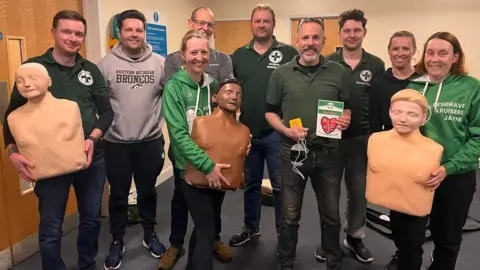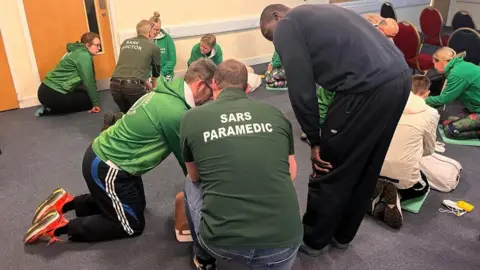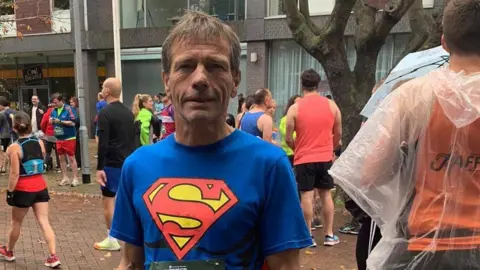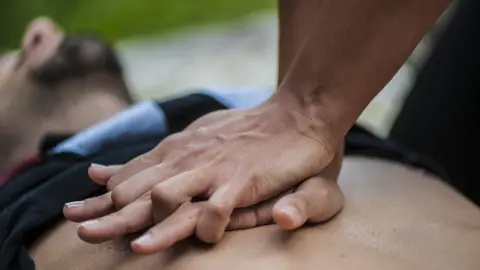Ipswich Half Marathon: Kesgrave runners learn CPR after life saved
 Kesgrave Kruisers
Kesgrave KruisersA running club has learned life-saving skills after one its members helped save a man's life during a race.
John Thurkettle, 60, was taking part in the Ipswich Half Marathon on 23 October when he went into cardiac arrest.
Kevin Ward, a member of Kesgrave Kruisers in Suffolk, was among those who came to his aid and carried out cardiopulmonary resuscitation (CPR) until emergency services arrived.
Forty members from his club took part in a CPR training session on Tuesday.
Mr Thurkettle's son James said: "It's really reassuring to know that this many people want to get involved and be trained in something that can genuinely save lives.
"It all comes down to education and the more people who can come to sessions like this is brilliant.
"Anything people can do to learn a little bit more and be a little bit more confident, it really does make a difference. Without people like Kevin being trained and having that fast response, then we don't know where my dad could be now."
The CPR training at Kesgrave Community Centre was led by Suffolk Ambulance Rescue Service (SARS), a team of specialist volunteer responders.
During the session, participants learned how to recognise if someone had gone into cardiac arrest, what to do and practised the basic skills, including performing chest compressions and how to use a defibrillator.
Paramedic and SARS volunteer Daimon Wheddon, who led the session, said it was "really important" for people to learn the basics of CPR.
 Kevin Ward
Kevin WardMr Ward said he was "really pleased" with the take-up from his club and said it would hold another session if there was demand.
"It's great that so many people are keen to come and learn how to do CPR. They see there is a need and you don't know what might happen, when you might need to use that skill," he added.
Those who took part said it was "really useful".
 Family photo
Family photoFather-of-four Mr Thurkettle collapsed at mile 11 of the 13.1-mile (21km) event.
Mr Ward, together with off-duty GP Ben Solway and physio David Smith, administered CPR as soon as they realised he had stopped breathing and his pulse had stopped.
James Thurkettle previously said his dad was "blessed enough to be surrounded by people who had the knowledge of what to do and were willing to do it".
He said his dad, who was later diagnosed with an underlying heart condition, had a stent fitted on Friday and was "doing really well".

Key facts about resuscitation
 Getty Images
Getty Images- In the UK, there are 60,000 cases of sudden cardiac arrest (SCA) every year
- Fewer than one person in 10 survives when an SCA occurs out of hospital
- The victim's chance of survival falls by about 10% with every minute that defibrillation is delayed
- CPR and the use of an automated external defibrillator significantly improve survival
- Performing CPR can more than double a person's chances of survival in some cases
Source: Resuscitation Council UK and BBC

Find BBC News: East of England on Facebook, Instagram and Twitter. If you have a story suggestion email [email protected]
